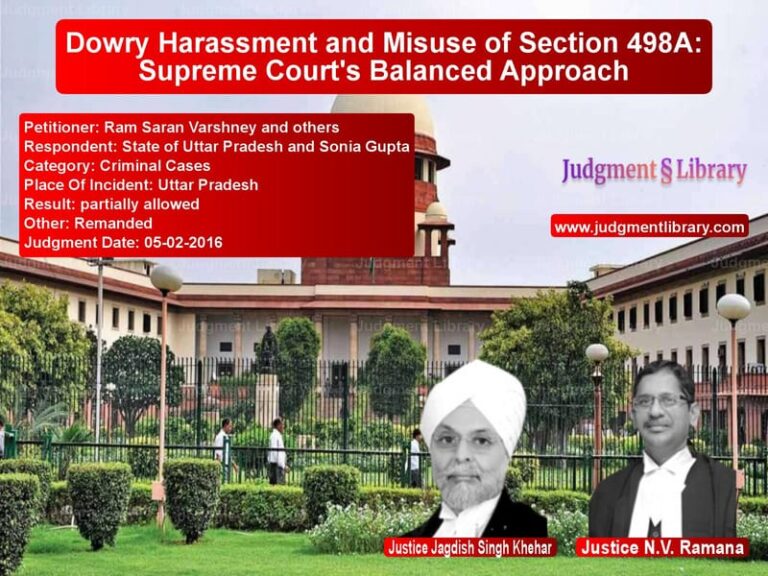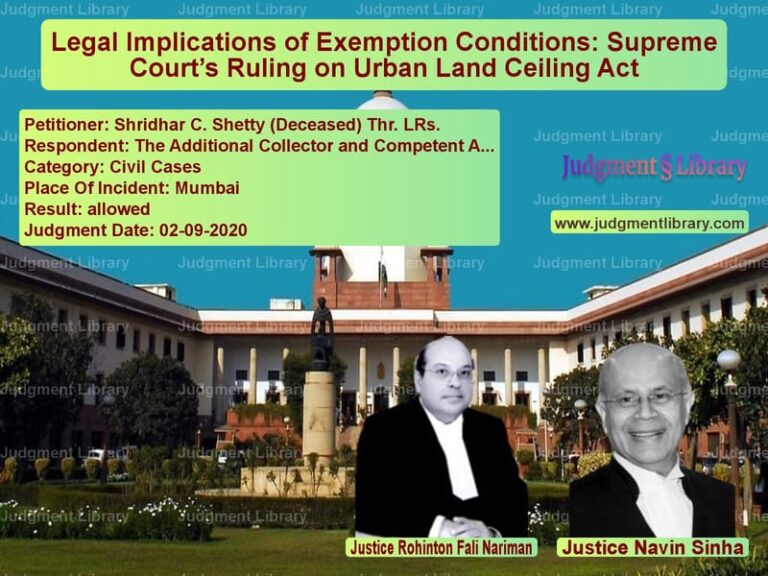Supreme Court Upholds Limitation in Insolvency Appeals Under IBC
The Supreme Court of India has ruled on a significant matter concerning limitation periods in insolvency proceedings under the Insolvency and Bankruptcy Code, 2016 (IBC). The case, V. Nagarajan vs. SKS Ispat and Power Ltd. & Ors., focused on whether the appeal before the National Company Law Appellate Tribunal (NCLAT) was time-barred due to the failure of the appellant to obtain a certified copy of the order within the prescribed timeframe.
Background of the Case
The appellant, V. Nagarajan, was the liquidator of Cethar Ltd., a corporate debtor undergoing insolvency resolution. During the liquidation proceedings, the appellant attempted to resist the invocation of a bank guarantee by SKS Ispat and Power Ltd., claiming that the transaction was fraudulent. The National Company Law Tribunal (NCLT), Chennai, dismissed the appellant’s application on December 31, 2019, ruling that performance guarantees do not fall within the definition of ‘security interest’ under Section 3(31) of the IBC.
The appellant sought to appeal against this order before the NCLAT but failed to do so within the 30-day statutory limitation period. The NCLAT dismissed the appeal on July 13, 2020, ruling that it was barred by limitation. The appellant then approached the Supreme Court, contending that the appeal should be considered valid since he had not received a free certified copy of the NCLT order.
Arguments by the Petitioner (V. Nagarajan)
The appellant raised the following key arguments:
- The limitation period should start from the date on which the certified copy of the order is made available to the petitioner, not from the date of pronouncement.
- The NCLT order was uploaded only on March 12, 2020, with a corrected version uploaded on March 20, 2020. The appellant claimed that he requested a free copy on March 23, 2020, but never received it.
- Due to the COVID-19 lockdown, the appeal could not be filed earlier, and the Supreme Court’s suo motu extension of limitation should apply to the case.
- Section 420(3) of the Companies Act, 2013, requires that a free certified copy of the order be provided to the appellant, and the limitation period should start only after such a copy is received.
Arguments by the Respondents (SKS Ispat and Power Ltd.)
The respondents, represented by Senior Counsel Neeraj Kishan Kaul, countered with the following arguments:
- Under Section 61 of the IBC, an appeal must be filed within 30 days from the date of the order, with a maximum extension of 15 days for sufficient cause.
- The appellant was present in the NCLT when the order was pronounced on December 31, 2019, and should have applied for a certified copy promptly.
- The IBC is a special law that overrides general provisions of the Companies Act and Limitation Act, and the appellant cannot indefinitely delay the appeal by waiting for a free certified copy.
- The appellant failed to show due diligence by not filing for a certified copy and, therefore, cannot claim an extension.
Supreme Court’s Judgment
The Supreme Court upheld the NCLAT’s decision, ruling that the appeal was indeed time-barred. The key findings of the Court were:
- The limitation period under Section 61(2) of the IBC is strict, allowing only a 30-day period to file an appeal, with an extension of 15 days under exceptional circumstances.
- The absence of the phrase “from the date on which a copy of the order is made available” in Section 61(2) of the IBC, unlike Section 421(3) of the Companies Act, indicates that the limitation period begins from the date of the pronouncement of the order.
- The appellant should have applied for a certified copy immediately instead of waiting for a free copy under Section 420(3) of the Companies Act.
- Timeliness is crucial in insolvency proceedings to maintain efficiency and prevent undue delays in corporate resolution.
The Court observed: “Accepting a construction that allows parties to wait indefinitely for a free certified copy would defeat the objectives of the IBC and disrupt the timely resolution of corporate insolvency cases.”
Conclusion
The Supreme Court’s decision in V. Nagarajan vs. SKS Ispat and Power Ltd. reinforces the importance of adhering to strict timelines in insolvency appeals. The ruling clarifies that the limitation period under Section 61(2) of the IBC begins from the date of pronouncement, and an appellant must act diligently to obtain a certified copy rather than relying on the provision for a free copy. This judgment strengthens procedural discipline in insolvency cases and ensures that resolution processes are not unduly delayed.
Petitioner Name: V. Nagarajan.Respondent Name: SKS Ispat and Power Ltd. & Ors..Judgment By: Justice Dhananjaya Y Chandrachud, Justice Vikram Nath, Justice B.V. Nagarathna.Place Of Incident: Chennai, Tamil Nadu.Judgment Date: 22-10-2021.
Don’t miss out on the full details! Download the complete judgment in PDF format below and gain valuable insights instantly!
Download Judgment: v.-nagarajan-vs-sks-ispat-and-power-supreme-court-of-india-judgment-dated-22-10-2021.pdf
Directly Download Judgment: Directly download this Judgment
See all petitions in Bankruptcy and Insolvency
See all petitions in Corporate Compliance
See all petitions in Company Law
See all petitions in Judgment by Dhananjaya Y Chandrachud
See all petitions in Judgment by Vikram Nath
See all petitions in Judgment by B.V. Nagarathna
See all petitions in dismissed
See all petitions in supreme court of India judgments October 2021
See all petitions in 2021 judgments
See all posts in Corporate and Commercial Cases Category
See all allowed petitions in Corporate and Commercial Cases Category
See all Dismissed petitions in Corporate and Commercial Cases Category
See all partially allowed petitions in Corporate and Commercial Cases Category







